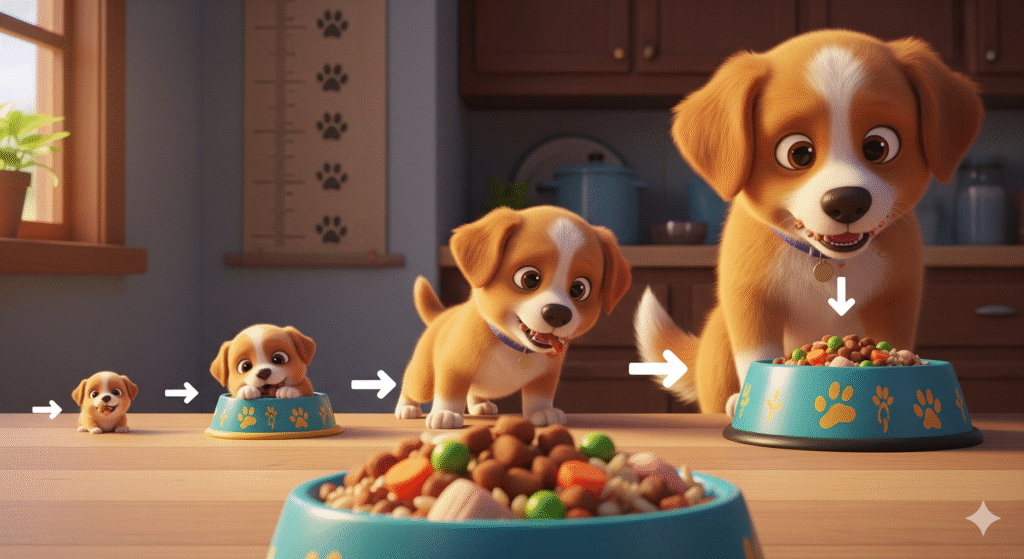
Bringing a new puppy home is an exciting and joyful experience. Puppies grow quickly during their first year, and the food they eat plays a major role in their overall health, energy, and development. Just like human babies, puppies need a diet filled with the right nutrients to build strong bones, develop healthy muscles, and support their growing immune system. Choosing the best food options for puppy growth and development can feel overwhelming, but with the right guidance, you can make feeding time a positive step toward your pup’s healthy future.
Why Puppy Nutrition Matters 🥩
Puppies have different dietary needs compared to adult dogs. Since their bodies are growing at a rapid pace, they require higher levels of protein, fat, vitamins, and minerals. Without proper nutrition, your puppy could face problems like weak bones, poor muscle growth, or low immunity. Feeding your puppy high-quality food not only helps them grow strong but also gives them the energy they need for playtime, training, and socialization.
Key Nutrients Your Puppy Needs 🍗
When choosing puppy food, always look for these essential nutrients:
- Protein – Builds muscles and tissues. Chicken, turkey, beef, and fish are great protein sources.
- Fats – Provide energy and support brain development. Look for foods with healthy fats like salmon oil or chicken fat.
- Calcium and Phosphorus – Strengthen bones and teeth. Balanced levels are crucial for preventing joint issues later in life.
- Vitamins and Minerals – Support overall health and immunity. Puppies need vitamins like A, D, and E in the right amounts.
- DHA (Omega-3 fatty acid) – Helps with brain and vision development, often found in fish-based foods.
Best Food Options For Puppies 🦴
- Dry Kibble (Puppy Formula)
Specially formulated puppy kibble is one of the most convenient and balanced options. Brands often design their recipes with the right mix of protein, fat, and essential nutrients to support puppy growth. Look for high-quality kibble with real meat as the first ingredient. - Wet Puppy Food
Wet food is softer and more palatable, making it perfect for picky eaters or very young puppies. It provides hydration along with nutrition and can be mixed with kibble for variety. - Fresh or Homemade Meals
Some pet owners prefer cooking at home for their puppies, using ingredients like chicken, rice, vegetables, and eggs. While this can be healthy, it’s important to ensure the meals are nutritionally balanced. Consulting a vet before starting homemade diets is highly recommended. - Raw Diets
Raw feeding has become popular for dogs, including puppies. A raw diet usually includes raw meat, bones, fruits, and vegetables. While many owners believe it supports natural growth, raw diets require careful handling and balance. Always discuss this option with a vet before introducing it. - Breed-Specific Puppy Food
Large breeds like Labradors or German Shepherds grow at a different pace compared to small breeds like Chihuahuas or Pomeranians. Breed-specific puppy food helps ensure the right nutrient balance for your puppy’s size and growth rate.
Feeding Schedule For Puppies ⏰
Along with the right food, maintaining a proper feeding schedule is essential:
- 6–12 weeks old – Feed 4 small meals a day.
- 3–6 months old – Reduce to 3 meals a day.
- 6–12 months old – Feed 2 meals a day.
Consistency helps prevent digestive issues and keeps your puppy energized throughout the day.
Tips For Healthy Puppy Feeding ✅
- Always provide fresh water alongside meals.
- Avoid feeding table scraps, chocolate, onions, or grapes—these are toxic to dogs.
- Transition gradually when switching puppy foods to avoid stomach upset.
- Monitor your puppy’s weight and energy levels; adjust portions if needed.
- Consult your vet regularly to ensure your puppy’s diet supports their specific breed and health needs.
Final Thoughts 🐾
The early months of your puppy’s life are a critical stage for growth and development. Choosing the best food options ensures they develop into a strong, happy, and healthy adult dog. Whether you go with high-quality kibble, wet food, or a carefully planned homemade diet, the key is balance, consistency, and the right nutrients. With love, care, and the right food, your puppy will thrive and bring joy to your family for years to come. PetsDogPuppy
